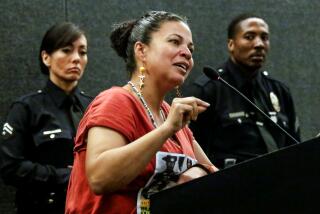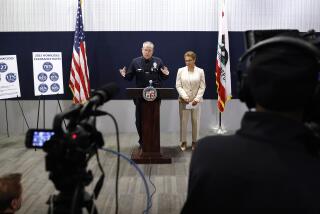Groups back Gardena effort to block release of police-shooting videos
- Share via
Setting the stage for a legal showdown over the line between police transparency and privacy, a variety of California law enforcement organizations are backing an effort by the city of Gardena to bar the public release of videos showing a controversial police shooting.
At issue are videos taken by dashboard cameras in police cars showing Gardena police officers fatally shooting one man and wounding another in 2013. The shooting ultimately resulted in a $4.7-million settlement to the victims and their families, but Gardena city officials are fighting to prevent the videos from becoming public.
The battle comes as police agencies nationwide are using officers’ body cameras and their vehicles’ dashboard cameras to record police interactions. Most police agencies have vowed to keep those recording private, sparking protests from some civil liberties groups.
Gardena could end up becoming a test case in this debate.
“This case illustrates the dilemma police face with new technology that can let the public be right there,” said Geoff Alpert, professor of criminology at University of South Carolina. “Everybody talks about transparency; they don’t always practice it.”
The videos are under seal in federal court, which heard the civil rights suit that resulted in the settlement. The Los Angeles Times along with Bloomberg and the Associated Press are seeking to unseal the videos, saying it’s in the public interest for the information to be made public.
But Gardena argues that releasing the videos would violate the privacy of the officers and others who were recorded.
In court papers filed last week, the Los Angeles County Police Chief’s Assn., California Police Chiefs Assn., California State Sheriffs’ Assn. and the California Peace Officers’ Assn. expressed support for Gardena’s position. The organizations noted that such seals are common practice nationwide. In addition to the privacy concerns, the groups said releasing the videos could potentially interfere with future investigations by revealing police tactics.
They also said releasing the tapes might make people less likely to cooperate with police and could discourage the use of cameras by other law enforcement agencies.
The dashboard cameras recorded parts of the June 2, 2013, incident outside a drugstore. Officers fatally shot Ricardo Diaz Zeferino. Eutiquio Acevedo Mendez suffered a gunshot wound to his back, leaving bullet fragments near his spine.
Police were called to the scene after a bicycle was stolen from outside the CVS drugstore on Western Avenue. A police dispatcher mistakenly told officers that the crime was a robbery, which usually involves a theft using weapons or force, and officers headed to the area in search of two suspects.
Sgt. Christopher Cuff saw two men riding bicycles east on Redondo Beach Boulevard. The men were friends of the bike theft victim and were searching for the missing bicycle. Mistaking them for the thieves, Cuff ordered the men to stop and put their hands up, according to a district attorney’s memo written by a prosecutor who reviewed the police videos.
Diaz Zeferino, whose brother owned the stolen bicycle, ran up to his friends as they stood before the police car. A dash camera video captured him yelling at the sergeant, who screamed in English and Spanish for Diaz Zeferino to stop advancing, the district attorney’s memo said.
Diaz Zeferino raised his hands, pounded his chest with both hands and said something that was inaudible, the memo said. One of his friends later told investigators that Diaz Zeferino was explaining that police had stopped the wrong people.
Two more police cars arrived, and three officers emerged with guns drawn.
The patrol car video showed Diaz Zeferino dropping his hands and reaching to his right waistband or rear right pocket and making a tossing motion, dropping an object on the ground, the district attorney’s memo said. He raised his hands, then repeated the move and removed something from his left rear pocket, the memo said.
“You do it again, you’re going to get shot,” yelled an officer on the video, according to the memo.
Diaz Zeferino removed his baseball hat and lowered his hands. As he began to raise his hands again, three of the officers opened fire, the district attorney’s memo said.
Attorneys for Gardena noted in court papers that the city “paid a premium” to settle the lawsuit with the understanding that the videos would not be made public.
An attorney for the state chiefs association made the same point in the organization’s legal brief.
“The defendants paid over $4 million to buy their peace,” the attorney wrote.
Attorneys for the families say they would like the videos made public.
In California, videos are rarely released. But some other states are more forthcoming.
Alpert, the criminal justice professor, said the case deals with a basic question.
“Either you are transparent or you are not,” he said. “Clearly, the chiefs and sheriffs’ actions here speak loudly that they prefer to be secret.”
Twitter: @LAcrimes
More to Read
Sign up for Essential California
The most important California stories and recommendations in your inbox every morning.
You may occasionally receive promotional content from the Los Angeles Times.











